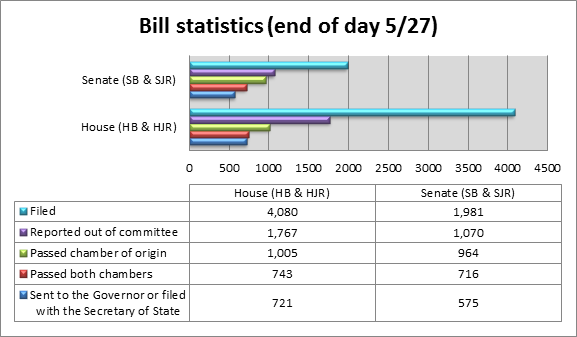After 140 days, the regular session of the 83rd Legislature adjourned sine die on May 27, 2013. What's next for the thousands of pieces of legislation considered during the regular session?
How many bills were filed? How many passed?
How many bills were filed? How many passed?
The legislative statistics report from Texas Legislature Online shows 5,868 House and Senate bills were filed during the regular session of the 83rd Legislature; 1,437 bills passed.
See our bill statistics page for more historical statistics.
If the Legislature passes a bill, does it become a law right away?
No. Under Article 4, Section 14 of the Texas Constitution, bills passed by the Legislature must be submitted to the Governor for approval. The Governor can sign a bill, veto it, line-item veto an appropriation, or allow a bill to become law without his signature.
How long does the Governor have to approve or veto legislation?
The Governor has twenty days after final adjournment to consider bills received in the final ten days (not counting Sundays) of the session. Sunday, June 16 is the last day the Governor can sign or veto legislation.
The Governor has twenty days after final adjournment to consider bills received in the final ten days (not counting Sundays) of the session. Sunday, June 16 is the last day the Governor can sign or veto legislation.
If the Governor approves a bill, when will it take effect?
The text of a bill may include effective date provisions requiring the bill to take effect immediately, to take effect on a specified day, or there may be no mention of an effective date. Different sections of a bill may have different effective dates.
According to Article III, Section 39 of the Texas Constitution, a bill cannot become effective until at least 90 days after the session ends unless the bill passes both chambers with a favorable vote by two-thirds of the members.
Monday, August 26, 2013 is the 91st day following final adjournment; bills that do not specify an effective date and those that did not have the two-thirds vote necessary to take effect earlier will take effect on August 26.
If a bill received the votes necessary to become effective immediately, it will take effect on the date of the last action necessary for it to become law. This could be when the Governor signs it, when the Governor files it with the Secretary of State without approving or vetoing it, or when the time for the Governor to act expires, if the bill has not been approved or vetoed during that time.
Use Texas Legislature Online to track the status of bills.
What happens to bills that did not pass?
Bills that did not make it completely through the legislative process die with the end of the session and are not automatically reintroduced during the next session.
What about other types of legislation?
Joint resolutions that propose amendments to the Texas Constitution do not require the approval of the Governor, and are filed with the Secretary of State. Proposed constitutional amendments are sent to the voters for approval or disapproval.
The 83rd Legislature passed 6 joint resolutions proposing constitutional amendments. These proposed amendments will be on the ballot on November 5, 2013.
Most concurrent resolutions must be sent to the Governor for approval. The Governor must approve a concurrent resolution for it to take effect.
Simple resolutions are passed by only one chamber of the Legislature, and do not require the Governor's approval.


